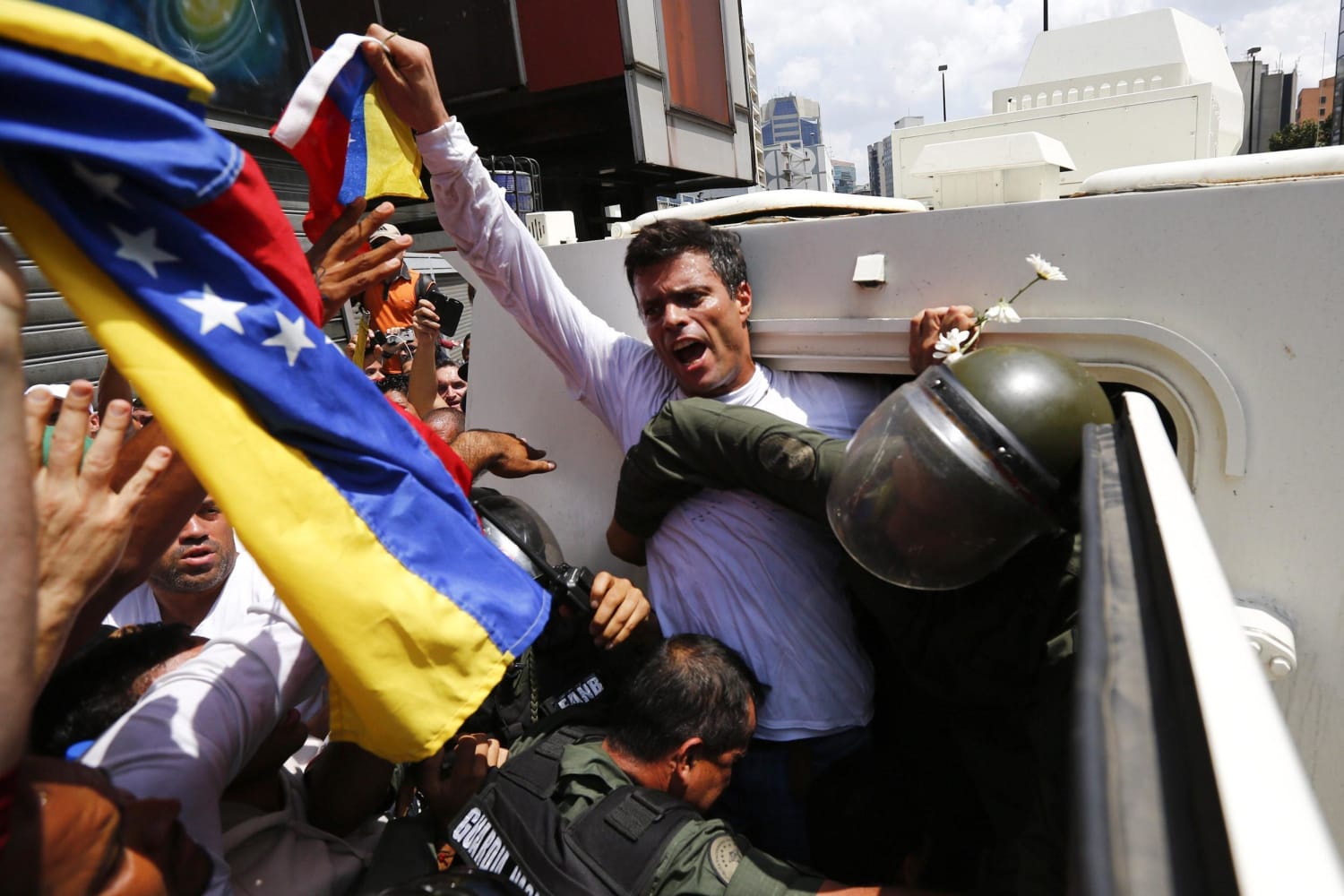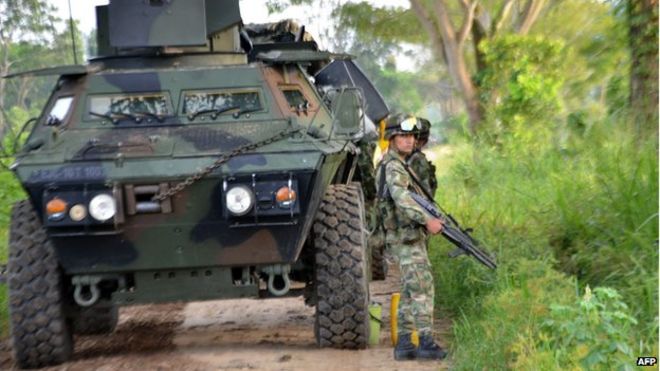Venezuela and Spain Quarrel Over Jailed Opposition Leaders
By Delisa Morris
Impunity Watch Reporter, South America
CARACAS, Venezuela — Ambassadors from both Spain and Venezuela have been summoned due to the remarks made by Venezuelan President Nicolas Maduro concerning Spain’s take on the opposition crackdown.

During protests that occurred almost a year ago, President Maduro jailed several opposition leaders and has largely ignored numerous international outcry’s for their freedom.
Maduro made less than favorable comments toward Spain on Tuesday after the Spanish Parliament passed a motion calling for the release of opposition leaders jailed in the South American country. Venezuela is a former colony of Spain.
President Maduro condemned the measure as “an act of aggression by corrupt Spanish elites” and called Spain’s Prime Minister Mariano Rajoy “a racist”.
He also accused the Spanish parliament of interfering in Venezuela’s affairs and recommended it “look after its mother”.
“In Spain, they are all racists,” he added, warning, “I am ready for the battle against Madrid.” He also threatened to go “on a tour of Spain and announce my candidacy for president,” even though Spain is run under a parliamentary system where non-members of the legislature cannot campaign for the top spot
The Spanish foreign ministry summoned Venezuelan Ambassador Mario Isea to tell him that Maduro’s “statements, insults and threats” were “intolerable”, it said in a statement.
Venezuela in turn summoned Spanish Ambassador Antonio Perez-Hernandez y Torra in protest, complaining of Spain’s “meddling and disrespectful statements”, said Venezuelan Foreign Minister Delcy Rodriguez.
“We again call on the Spanish government to respect Venezuela’s sovereignty,” she said.
The negative treatment of opposition leaders by the Venezuelan government is a regular source of tension between the two countries.
Some of the jailed leaders include Leopoldo López, who was arrested in February 2014 for organizing a peaceful protest against Maduro, the mayor of western regional capital, San Cristóbal, and the mayor of the national capital, Caracas, have been arrested for expressing disagreement with the socialist government. Maduro accused both of being involved in a conspiracy to overthrow him.
Venezuela recalled its ambassador to Spain for consultations in February after Rajoy met with Lilian Tintori, the wife of jailed opposition leader Leopoldo Lopez.
The following month Rajoy met with Mitzy Capriles, the wife of Caracas mayor Antonio Ledezma, who has also been jailed in what Venezuelan opposition figures said was the latest crackdown on criticism of Maduro’s left-wing government.
Spanish political figures have been increasingly vocal in condemning human rights abuses in Venezuela. Former Spanish President Felipe González has personally taken it upon himself to defend López and Caracas Mayor Antonio Ledezma in Venezuela’s courts. This prompted Maduro to immediately accuse González of spearheading a coup attempt against him.
For more information, please see:
ABC News – Spain Files Protest With Venezuela Over President’s Comments – 16 Apr. 2015
The Local – Diplomatic spat: Spain, Venezuela tensions rise – 16 Apr. 2015
BreitBart – Spain Lodges Protest with Venezuela after President Calls Nation ‘Rascists’ – 16 Apr. 2015
telesur – Respect International Law, Venezuela Tells Spanish Diplomat – 15 Apr. 2015
VDC: For the 21st time, Syria’s Counter-Terrorism Court Postpones Verdict in the Trial of SCM Members
Colombian Government to Resume Bombing of FARC Targets after Rebels Attack Colombian Troops
By Kathryn Maureen Ryan
Impunity Watch, Managing Editor
BOGOTA, Colombia – Colombia’s President, Juan Manuel Santos, has ordered the resumption of bombing raids against Fuerzas Armadas Revolucionarias de Colombia, the Revolutionary Armed Forces of Colombia (FARC) rebels after an attack he blamed on the group killed Colombian 10 soldiers. The move, which broke a fragile truce between FARC and the Colombian government will likely intensify combat in the region. The Colombian government halted bombing raids targeting FARC as part of peace talks between the two parties in recognition of a unilateral ceasefire declared in December by the FARC insurgents.

According to Al Jazeera’s Alessandro Rampietti said of the FARC attack against Colombian troops that “this is the deadliest attack since they announced the unilateral indefinite ceasefire back in December. And comes just a few days since the Colombian government announced the extension of the suspension of the air raids over FARC camps.” He added that at the present movement, it is not clear what the effects of these attacks will have on ongoing peace talks between FARC and the Colombian Government. FARC negotiators in Cuba committed to the unilateral ceasefire to promote peace talks that have taken place in Cuba over the past two years. FARC negotiators claimed the insurgents would only fire their weapons if they were first attacked by the armed forces. However, it is unclear how much control FARC rebel leaders in Havana really have over the more than 7,000 fighters participating in the FARC insurgency.
Ten Colombian soldiers were reportedly killed in the rural southwestern Cauca province in the early hours of Wednesday when the FARC launched an ambush against the troops, throwing grenades and firing on them as they sheltered in a covered sports pitch, the Colombian army said. “This incident was a product of a deliberate attack by the FARC, it was not a coincidence and this implies a clear rupture of the promise of a unilateral ceasefire,” President Santos said, after meeting with his Administration’s defense team in the city of Cali. “I have ordered the armed forces to lift the suspension of bombings on FARC camps.”
FARC is the largest rebel organization in Colombia, a nation that has been a haven to illegal drug and human traffickers for several decades. The organization was founded 1964 with the stated aim of installing a Marxist regime in the South American state. In five decades of conflict more than 220,000 people are estimated to have been killed. While the FARC movement claims its motives are to establish a Marxist regime, a regime that in theory would focus on the rights of workers, the paramilitary organization has targeted trade unions, even assassinating their leaders, for several decades leading to the degradation of the Labor movement in a countries who’s labor unions were once the among the strongest in Latin America. Colombia has experienced the highest number of assignations of trade union leaders and labor activists of any country in the world. FARC is listed as a terrorist organization by both the United States and Europe.
For more information please see:
Al Jazeera – Colombia to Resume Bombing of FARC Targets – 16 April 16, 2015
BBC News – Colombia Lifts Bombing Truce after FARC Attack in Cauca – 16 April 2015
CNN International – Colombia Renews Bombing Raids on FARC After Rebels Kill 10 Soldiers – 15 April 2015
Reuters – Ten Colombian Soldiers Killed In Attack Blamed On FARC Rebels – 15 April 2015
Blackwater Guards Sentenced For Role in Nisoor Square Shooting
By Lyndsey Kelly
Impunity Watch Reporter, North America
WASHINGTON D.C., United States of America – U.S. District Judge Royce Lamberth sentenced former Blackwater security guard Nicholas Slatten to life in prison and three others, Paul Slough, Evan Liberty, and Dustin Heard to 30-year terms for their roles in a 2007 shooting hat killed 14 Iraqi civilians in Baghdad’s Nisoor Square, after being convicted in October.

Judge Lamberth announced the sentences after a daylong hearing at which defense lawyers have argues for leniency and presented character witnesses for their clients. The defense argued, saying decades-long sentences would be unconstitutionally harsh for men who operated in a war-torn environment. Prosecutors described the shooting as an unprovoked ambush of civilians and said that the men have not shown any remorse or taken responsibility for their part in the incident. Lamberth stated, “based on the seriousness of the crimes, I find the penalty is not excessive.”
Families of the victims spoke in favor of harsh sentences, including Mohammad Kinani Al-Razzaaq, whose 9-year-old son was killed in the incident. Al-Razzaq demanded that the court show Blackwater “what the law is.”
However, it is unlkely that the sentencing hearing will be the last for these men. Even before the trial began, defense lawyers identified issues, which would form the basis of an appeal, including whether there was proper jurisdiction to charge the defendants in the first place.
The men were charfed under the Military Extraterritorial Jurisdiction Act, which covers overseas crimes of Defense Department civilian employees, military contractors and others who are supportingthe American war mission. The defense argues that the Blackwater defendants worked as State Department contractors and were not military.
For more information, please see the following:
AL JAZEERA – Blackwater Guards Sentences in 2007 Shooting – 13 April 2015.
MSNBC – Ex-Blackwater Guards Hit With Lengthy Prison Sentences – 13 April 2015.
US NEWS – Blackwater Guards Who Slaughtered 14 Iraqis Get 30 Years, Life – 13 April 2015.